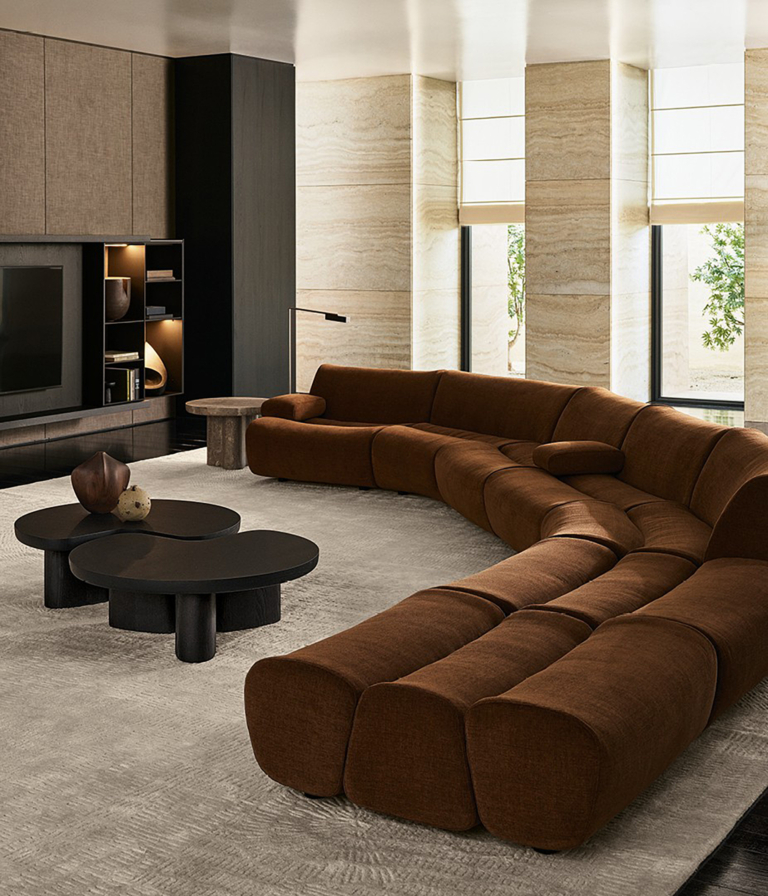
A Decade of Local Design – Coco Flip
Celebrating 10 years of working closely with local craftspeople and makers, Coco Flip draws on travel as both muse and source of new perspectives. Recently launching two new collections influenced by the Art Deco movement, Coco Flip’s ethos is grounded in considered design.
Based in the creative diverse Melbourne suburb of Northcote, the furniture and lighting design studio, established in 2010, celebrated 10 years in business. Founders Kate Stokes and Haslett Grounds combine their ethos of design that is considered, timeless and crafted for longevity. Two new collections were launched at Denfair in 2019, which drew inspiration from the Art Deco movement through celebrating curved forms and a repeated geometry.
Kate and Haslett regularly travel, immersing themselves in new environments and absorbing the experience of different cultures and traditions. Kate says, “new destinations and cultures help us see things from a fresh perspective and renew our enthusiasm for design.” Another key factor in the growth of Coco Flip is an emphasis on local small-scale production. “This focus has shaped our brand in so many ways and it’s been the cornerstone of our business from the start,” Kate reflects. “It means we have very personal connections with our makers and our products, and it enables us to keep the business lean and nimble, while having a much smaller impact on the planet environmentally.”
Founders Kate Stokes and Haslett Grounds combine their ethos of design that is considered, timeless and crafted for longevity.
Through 10 years of collaborating with local craftspeople and makers and observing their honed knowledge and experience, Kate says, “we also spend a large amount of time researching new materials and processes, as it helps us form boundaries to influence interesting ideas afforded by material constraints.” In the early days of Coco Flip, she says they realised that “people were starting to be more interested in Australian design and in knowing where their pieces came from and how they were made, and keeping things local means we can really engage with the manufacturers and stay connected to every aspect of the products we design.”
For Kate and Haslett, “our business is so personal to us.” This means that a close working relationship with local makers is essential to Coco Flip’s work. “We decide very early on who is going to be producing a particular piece and we bring them along for the ride,” Kate explains. She adds this is due in part to the fact that “we learn so much from the manufacturers who have years of experience and this means we can nut out challenges together and have a good understanding of costs along the way.”
“New destinations and cultures help us see things from a fresh perspective and renew our enthusiasm for design.”
In the 10 years since Coco Flip was founded, the designers have seen a significant change in the Australian design industry. “In such a connected world, Australia seems less isolated than in the past, and our architecture, interiors and product design are seen as fresh and distinctive in other parts of the world,” Kate explains. Adding to this, the reality that each piece is produced locally contributes to a sense of craft and the artisanal maker that is otherwise lost in mass production. “In this way, the objects we surround ourselves with help to form our own narrative about our personal values,” says Kate. “People seem not only to be drawn to the products being made locally, but also to knowing the design story – seeing our process, our studio and the hands-on nature of our practice.”
Key to the Coco Flip is an emphasis on longevity and endurance. Kate describes Coco Flip’s ethos as “aesthetically, we try to strike a balance between minimal and playful. We always aim for our products to be contemporary yet timeless and with a strong focus on their materiality and simple, geometric forms that people connect with and are easily incorporated into projects of different styles.” The resulting new collections Sequence and Honey are an extension of these values, founded on the principle Kate describes as “not too much, and not too little.” This is born of Coco Flip’s overarching inspiration, which comes from Scandinavian and Japanese aesthetics and a balance of materials and form. “Coco’s identity is contemporary, sophisticated and timeless with a hint of modernism,” Kate describes.
“Our business is so personal to us.”
The Honey collection sees a collaboration with local glass artist Amanda Dziedzic and Bendigo Pottery, designing to Art Deco sensibilities. Honey is offered as a pendant, wall light and table light and can be made in either slip-cast ceramic or turned timber, paired with a hand-blown glass. The Sequence collection, also heavily influenced by Art Deco style, was born from, as Kate says, “a desire to create a character-filled, affordable coffee table collection.” Made locally with metal spinners in Melbourne, “Sequence is a simple design with a lot of personality, and the production process allows the range to be versatile and customisable,” Kate adds.
With each piece instilled with its own unique personality, the central values that bind Coco Flip’s work (and latest collections) stay true to this dedication to considered authenticity. “We’re big believers in slow and steady, and plan to continue in that vein,” Kate says. “We’re excited to keep developing more quality furniture and lighting collections with a focus on materiality, character and local production, and we’ll continue working with our wonderful set of retailers and the talented architects and interior designers across Australia.”
The future for Coco Flip looks to be just as successful as the journey so far, with new projects on the horizon. “Designing for the NAU collection has been a really rewarding experience and we’re keen on more of these kinds of collaborations in the future,” says Kate.

![Book Flatlay Cover Front Transparent Trio[1]](https://d31dpzy4bseog7.cloudfront.net/media/2024/06/07080212/Book_Flatlay_Cover_Front_Transparent_Trio1.png)
































